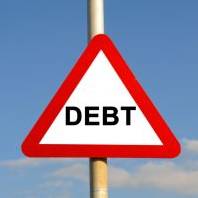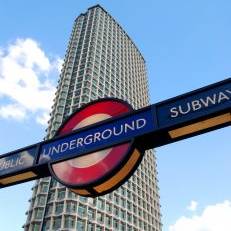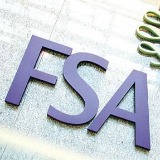
Do it right and credit cards are the cheapest way to borrow, you can get 0% for up to 15 months, yet get it wrong and you'll be stuck in debt for years.
This is a step by step guide, updated daily, to the cheapest credit cards for new borrowing, how to use them... saving you £1,000s
In this guide
Best Buys: Cards for spending
Is a credit card right for you?
Debt isn’t bad, bad debt is bad. Yet in these recession and credit crunch hit times, all borrowing is tinged with the dark side, lose your income and debt will leave you in a nightmare. Therefore before choosing which card is right for you, watch out for the following....
- Want to cut existing debt costs?
You don’t need this guide, which is about cards with cheap ‘purchases’ interest rates for new borrowing. Instead please read the Cheap Balance Transfers guide instead. - Don’t use cards to supplement day-to-day spending.
The huge worry about credit cards is they allow you to borrow willy-nilly, there's no structure. This is one of the reasons they’re the primary cause of personal debt crisis; many people simply use their cards to supplement their income.
To correctly use a credit card, ensure all borrowing is planned, budgeted for and as cheap as possible. If you’re just grabbing it to ease the strain on your pocket, that's a mammoth danger signal, please read the Debt Problems guide before getting yourself into trouble. - Have you budgeted and planned repayments?
Always borrow as little as you possibly can. Yet it's not just about how much, but also how quickly you can repay. The quicker you can repay the cheaper it will be. Use the free Budget Planner to help. - Don’t borrow your way out of debt.
If you’re getting a new card to help ease existing debt, it's likely you’re going to make things worse. The old adage ‘never borrow your way out of debt’ still holds true. If you are having trouble making ends meet please read the Debt Help guide which will take you through debt issues step by step. - Watch out, lenders bite!
Credit card companies have an array of tricks to bite your cash. If you fail to repay in full, you'll pay interest on the whole amount. Miss a payment, or pay late and you can lose any cheap interest deals, be fined and hurt your credit score. Find out how to beat credit card tricks.

Is it worth getting a card?
Debt is like fire, used well it’s a great tool, used badly you’ll get burned. Unless you’re financially disciplined and doing it tactically for stoozing its always worth borrowing as little as you need, and where possible using savings instead of borrowing.
The worst thing to do with a credit card is to use it to fill the gaps your income doesn’t meet each month, that will see borrowings constantly grow and can leave you in a debt spiral (see the stop spending guide for more).
Ensure your borrowing stays free
However if you need to borrow for a defined purchase, credit cards used correctly are cheaper than loans
This may be for a football season ticket, as buying it is cheaper than getting each one individually; you may need a new sofa as the old one's kaput; or it might be to pay for a year’s car insurance as the insurer’s interest rate for paying by the month is huge.
Done right it is possible to borrow at no cost.
- Work out how much you need.
Don’t borrow more than you need, do a Budget Planner to ensure you can meet the repayments, use the card as a bespoke tool to do a specific job and stay disciplined. - Make at LEAST the minimum repayments
Ensure you set up a direct debit for at least the minimum repayments as soon as you are accepted, even though you are paying 0% you still need to make repayments. If you miss one you will lose your 0% deal, so the rate will jump and you'll get a £12 charge. - Clear the card within the 0% period.
Go even one month beyond the promotional period and the rate rockets, so calculate the amount needed to clear the balance by then. E.g. To borrow £600 on a year’s 0% card, divide the spend by the number of months (£600 / 12) to get the monthly repayment, in this case £50 and set up a direct debit to do that. - Diarise the end dates
Even if you've planned the repayment, it's vital that you diarise the 0% end dates (or use the Tart Alert) to ensure you pay off the debts in time, or be ready to switch to a new balance transfer deal (read the tarting explanation and the Best Balance transfers guide). If you forget to switch when the deal ends, the interest cost will swiftly outweigh the card's benefit.
To do this properly isn't just a question of getting the right card, it's about understanding how it works and how to avoid the massive pitfalls, and that's the point of this guide.
Pick the right type of card
To find out the best way for you to borrow, answer the questions below. They'll assess how you spend, and direct you to the relevant part of the guide.
 Will you pay your card off in full EVERY month?
Will you pay your card off in full EVERY month?
Select NO even if you only rarely fail to do this
Should you tart?: Keep your debt at 0%
While disloyalty is frowned on in relationships, it's lauded for consumers. Credit card tarts are people who shift debt from 0% deal to 0% deal to ensure the minimum possible cost for their debts. This is by far the cheapest way to use credit cards, but it takes discipline and a good credit score.
How to tart
If you're a new tart, the process is pretty simple.
- Get a 0% purchases card.
This is a card that you can spend on, and all the spending will be at 0% for a set period; see the longest 0% deals below. - Ensure you make the repayments.
All 0% interest means is that there is no cost to the borrowing; it still needs to be repaid. You should ensure you make at least the minimum repayments to avoid being fined, or worse still having the 0% deal closed down meaning you need to pay the expensive standard rate. - Move or repay the debt BEFORE the 0% period ends.
At the end of the 0% period the rate will jump to the standard APR which will usually be a huge 10-20%. At this point you either need to have the card cleared or shift it to a new card with a 0% Balance Transfer deal. If you still haven't repaid the debt when that deal closes, shift it again.
At this point you either need to have the card cleared or shift it to a new card with a 0% Balance Transfer deal. If you still haven't repaid the debt when that deal closes, shift it again.
To tart or not to tart?
Tarting is without doubt the cheapest method, but takes active management and you need to stay on top of it. If not there's a big warning...
Unless you shift the debt before the 0% period ends, it only takes a couple of months before all the gain is lost.
The other thing that's important to understand is that to tart, you're going to need a decent credit history, so it's important to Check Your Credit Rating, which can be done for free, before you start. Plus the nature of repeated applications can have an impact on your score.
So if you're going to take well over a year to repay and aren't good with money, or have a poor credit score, then it's best to stick with the best Long term low rate deal instead.
The cheapest cards for new borrowing
The choice is simple. Those who can pay off in under a year or are willing to tart, should go for a 0% deal. Everyone else should pick the cheapest long term low rate. All the following deals only apply to NEW cardholders. Also see the best cards for poor credit scorers section.
If your application's rejected, immediately check your Credit Rating. If you're accepted and the credit limit is too low, don't chuck the card, it's already on your credit file, simply apply for a second card to use alongside it; see the Low Credit Limit guide.
The Longest 0% deals
The primary aim is to find the card which will give you the longest 0% introductory deal. Sadly, other key factors such as acceptance criteria and credit limits are never public. The 'go to' rate that cards jump to after the 0% periods are also listed, but as these cards are only for tarts/quick repayers this hopefully won't impact you.
The two top cards have identical length 0% periods for spending, so to pick between them you need to look at the extra fringe benefits on offer.
Tesco, 0% for 15 months on purchasesPlus collect clubcard points
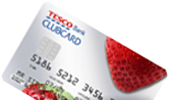
- 0% on spending length: 15 months
- Rep. variable APR: 16.9% (Official APR Example)
- Card issuer: Mastercard
- Min. Income: £5,000
- Min. Repay : Greater of 1% of balance plus interest or £25
- Anecdotal info: Credit limits: mid Ease of acceptance: mid
The Tesco* Clubcard Credit Card gives 0% for 15 months on new purchases and is joint top with M&S; below. You must earn over £5,000 in order to apply. After the 0% rate ends, it's 16.9% representative APR after, so ensure you've repaid in full or switch to a top Balance Transfer card.
- Spending rewards. Every time you spend you accrue Tesco clubcard points - 1 for every £4 spent. If redeemed for Tesco's 'Clubcard Rewards', they're worth about 3p each, making this equivalent to a 0.75% cashback card.
You can get the same length 0% period with Marks and Spencer, plus reward points to spend in there - preferably if you shop there more than Tesco - see full details.
Tesco often has special deals where you can collect extra clubcard points, and sometimes even make a profit. For more details read the Boost Tesco clubcard points guide. If you're a big M&S; shopper see that card below which matches the Tesco spending deal.
M&S;, 0% for 15 months on purchasesPlus 0.5% back in vouchers
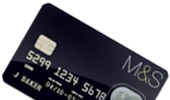
- 0% on spending length: 15 months
- Rep. variable APR: 15.9% (Official APR Example)
- Card issuer: Mastercard
- Min. Income: N/A
- Min. Repay : Greater of 1% of balance plus interest, 2.5% or £5
- Anecdotal info: Credit limits mid Ease of acceptance mid
Another card offering 15 months 0% on spending is the M&S;* Credit Card. After this the rate jumps to 15.9% representative APR.
- Spending rewards. You also collect points as you spend which will be converted into Marks & Spencer vouchers quarterly. You get 0.5% back on most purchases (50p per £100 spend) and 1% when you spend in M&S.;
M&S;, like many other banks, try hard to sell you other products and memberships once you are a customer, so be wary and make sure you really need something and can't get it cheaper before parting with cash.
Barclaycard: 14 months 0% on purchasesPlus 14 months on 0% BTs (2.9% fee) & £20 voucher
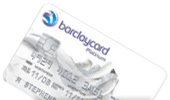
- 0% on spending length: 14 months
- Rep. variable APR: 18.9% (Official APR Example)
- Card issuer: Visa
- Min. Income: £20,000
- Min. Repay: Greater of 1% of balance plus interest, 2.25% or £5
- Anecdotal info: Credit limits: mid Ease of acceptance: mid
Offering a slightly shorter 14 month 0% on purchases is the Barclaycard Platinum*. Plus spend £100 on the card within 30 days of opening your account and you'll get a £20 Amazon voucher.
It also gives 'Freedom' reward points. However, you only earn these in a small set of shops as yet, so it's not as big a boon as Tesco Clubcard or M&S; schemes.
This card also offers 14 months 0% for balance transfers with a 2.9% fee, making it the top open-to-all '0% BTs and Purchases' card. You must earn £20,000 a year, and not already hold another Barclaycard in order to get this deal (and pass a credit check).
Go-to rate: The card has an 18.9% representative APR on both BTs and spending, so ensure you repay within 14 months or shift to new 0% BT card.
Virgin13 months 0% purchases and BTs (2.89% fee)
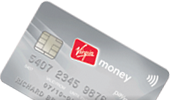
- 0% on spending length: 13 months
- Rep. variable APR: 18.9-20.9% APR (Official APR Example)
- Card issuer: Mastercard
- Min. Income: N/A
- Min. Repay : Greater of 1% of balance plus interest or £25
The Virgin* credit card gives 13 months 0% on purchases. If you have existing debts to transfer it also gives 0% for the same length of time on these with a fee of 2.89%.
After the 0% offer ends the interest rate jumps to 18.9% and 20.9% representative APR for purchases and BTs respectively, so make sure you've paid it off, or you're ready to shift the debt to a new balance transfer card.
You can't transfer existing credit card debts from any other Virgin or MBNA card to this one, so if that's what you want to do or if you want more info on All-Rounder cards read the 0% Spending & Balance transfer guide.
Halifax13 months 0% purchases and BTs (3% fee)
- 0% on BT and spending length: 13 months
- Representative variable APR: 17.9% (Official APR Example)
- Card issuer: Mastercard
- Min. Income: N/A
- Min. Repay : 1% of balance plus interest
The All In One card from Halifax* gives 0% for 13 months on spending and also balance transfers (with a 3% on the amount of debt transferred).
Sister bank Bank of Scotland* gives a slightly shorter 12 months 0% on spending and balance transfers (with 3% fee). After the 0% ends the rate for both cards jumps to 17.9% representative APR, so ensure you've repaid in full by then or are ready to switch away.
Existing Natwest / RBS customers13 months 0% purchases and BTs (2.9% fee)

- 0% on spending length: 13 months
- Rep. variable APR: 17.9% (Official APR Example)
- Card issuer: Mastercard
- Min. Income: £10,000
- Min. Repay: Greater of 1% of balance plus interest or £5
- Anecdotal info: Credit limits: mid Ease of acceptance: mid
Existing current account customers can get 0% on spending for 13 months on the Natwest* & RBS* YourPoints World card.
It gives 2,500 points when you successfully apply. 2,000 points is enough for a £10 voucher at retailers including Amazon, Boots and M&S.; You can continue to earn points as you spend, though they can be beaten by other top Cashback Cards.
It also has 13 months 0% on balance transfers with a 2.9% fee. The rate after the 0% periods end jumps to 17.9% representative APR, so ensure you've repaid in full by then or are ready to switch away.
Capital One - Mastercard0% until April 2012. Plus cashback
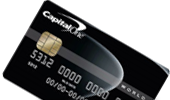
- Cashback: 3 mths 5% (max £100) | 0.5% to £6k | 1% to £6k-10k | 1.25% above £10k
- Paid out: Every January
- Max cashback/year N/A
- Annual fee: None
- Min spend N/A
- Rate: 0% on spending until April 2012 | 19.9% representative APR (see Official APR Example)
- Card issuer: Mastercard
- Min income: £20,000
New customers to the Capital One World Mastercard* get 0% until April 2012 so much shorter than the other cards above (when you apply before 9 October via the special link above). However, we've included it as it pays a huge 5% for the first 99 days (max £100 cashback in that time); then rates are tiered, paying up to 1.25% cashback.
There's no cap to the cashback you can earn in a year, yet the £100 intro maximum applies to the first three months, so if you spend over £2,000 (5% of which is £100) in the first three month, the extra is wasted for cashback purposes. After that, your spending resets, so the next £6,000 you spend is at 0.5%, then you move up the tiered rates.
To get one you must have an excellent credit rating, earn £20,000+ and even own your own home – pretty strict criteria, so check the other Cashback Card options if you don't think you'll measure up. Ensure it's fully repaid by April (after it's 19.9% representative APR).
Beware balance transfers

There's a devious trick some cards play if you have a 0% for purchases deal. Often they also allow you to shift debts to the card, but this can be at a higher interest rate.
The rules changed at the start of 2011 and now repayments must go towards the most expensive debts first, but as you're unlikely to be able to repay in full you'll still get charged interest.
So if you need to transfers debts it's best to use separate card instead, see Best Balance Transfers.
Cheapest long term low rate deals
Here the aim is to get a card where the low rate is for the long term, not just an introductory offer. While not 0%, it does mean that you don't have to remember to shift from card to card, and know you've got a deal for the long term.
Barclaycard Simplicity:7.9% standard rate

- Representative variable rate: 7.9% APR
- Min. Income: £20,000
- Min. Repay :Greater of 1% of balance plus interest, 2.25% or £5
- Anecdotal info: Credit limits: poor Ease of acceptance: mid
- Card issuer:Visa
There's currently only one low rate card for long-term spending, it's the Barclaycard* Simplicity, which charges 7.9% representative APR.
Is the rate fixed? While the card is variable rate, credit card regulations mean it's not allowed to increase within the first year, and after that as long as you agree not to borrow more you have a right to reject any rise (see Rate Jacking guide for full rules).
Like all credit cards, to get it you’ll be credit scored – while 51% of accepted applicants will get 7.9% some slightly poorer credit scorers may be given a higher rate. There are reports that it can give low credit limits.
Can these cards be used for balance transfers too?
Often, though not always, on these cards the rate applies to debt that is shifted to the card. If that's the case, and you're looking for long term cheap debt it's likely to be reasonably competitive and there's nothing wrong with doing it. Though always compare to the Best Balance Transfers first.
Yet don't assume the rate automatically applies for all transactions, for example Barclaycard Simplicity charges a big 15.8% rate for cash withdrawals. So never, ever, ever use it (or any credit card) for withdrawing cash.
Think before adding the 'insurance'
Payment protection insurance is commonly sold with credit cards - the idea is it'll make some payments for you, usually for a year, if you are unable to (eg, if you lose your job).
There have been a myriad of cases where it has been missold eg, borrowers didn't realise they were signing up for it, or it was totally unsuitable for them, and some big lenders have been fined.
The protection isn't always bad, though policies sold with cards are often overpriced (you pay a monthly amount depending on the size of your balance). If you want it, compare the lender's cover with standalone providers such as Paymentcare or Best Insurance.
Always be vigilant to check you aren't getting more than you bargained for when you fill in the application, then check your statement each month to check you aren't inadvertently paying for extras if you didn't ask for them.
Worried about being rejected?
The cards listed above are the market's top deals. Some of them require a good credit score. If you're worried about this then there are still ways to get good deals.

- Check your credit score for free.
Understanding why you may be rejected is crucial for picking the right card. So first use the Free Credit Check guide for a full explanation and how to check. - If you've only limited/minor issues.
The top cards listed above should still be accessible to you. Just avoid those where it notes they are particularly harsh credit scorers. - Use a 'credit-worthiness' comparison.
Those with only poor to moderate credit histories can use special credit worthiness comparisons. They don't do a credit search, as that itself would hit your credit score, instead they just ask a few basic credit history questions, giving a rough and ready assessment, followed by 'suitable cards'.
These services don't cover all cards, so they're only for those people with credit issues. The top pick is Moneysupermarket*, which asks a few quick questions and use ‘soft searches’ of your credit file, which importantly don’t leave a mark (hence don’t hit future applications).
The Size of the Saving
Someone spending £400 a month on a card (repaying £150 each month) on a First Direct Visa card at 17.9% would pay £300 interest in year one. On the Tesco card they'd pay nothing in the first 12 months.
Over three years the charge with First Direct is an enormous £2,800; Tesco, as the rate jumps to 16.9%, costs £2,200, but Barclaycard Simplicity costs only £1,180 while a good Credit Card Tart would pay nothing.
| |
Interest cost after | |||
|---|---|---|---|---|
6 months |
1 year |
3 years |
||
First Direct Visa |
17.9% | £90 |
£300 |
£2,800 |
| Tesco | 12 mths 0% then 16.9% | £0 |
£0 |
£2,200 |
| Barclaycard Simplicity | 7.9% | £40 |
£139 |
£1,180 |
| Credit Card Tarting (2) | 0% (rotating cards) | £0 |
£0 |
£0 |
| (1) For ease of comparison, ignores minimum payments rules and credit limits (2) needs a good credit score | ||||
Glossary
Ask a Question / Forum Discussion
Credit Card For Borrowing Discussion Area
Spotted out of date info/broken links?
Email brokenlink@moneysavingexpert.com to let us know
Always double check the product details before signing up to them

LINKS THAT HELP THIS SITE (all have a * in above article)
(this has no impact on product or pick - see explanation below)
Amex Platinum , Bank of Scotland , Bank of Scotland , Barclaycard Platinum , Barclaycard Simplicity , Capital One , Halifax , Halifax all in one reward , M&S; , Moneysupermarket smart search , Natwest , RBS , Tesco
Explanation (of * links)
How this site is funded. Two types of contacts are listed. The first, which all have a * within the main body of the articles, help MoneySavingExpert.com stay free to use, as they're 'affiliated links' which invisibly take you usually via affiliate linkage or commercial money sites, which then pay this site. It's worth noting this means the third party used may be named on any credit agreements. The second type doesn't help and therefore doesn't have a *.You shouldn't notice any difference, the links don't impact the product at all and the editorial line (the things we write) is NEVER impacted by the revenue - we aim to look at all available products. If it isn't possible to get an affiliate link for the best product, it is still included in exactly the same way. For more details read how this site is financed.
LINKS THAT DON'T HELP THIS SITE
(please only use if necessary)
No * Link Available: Sainsbury's 0%
Duplicate links of the * links above for the sake of transparency, but this version doesn't help MoneySavingExpert.com:
Amex Platinum , Bank of Scotland , Bank of Scotland , Barclaycard Platinum , Barclaycard Simplicity , Capital One , Halifax , Halifax all in one reward , M&S; , Moneysupermarket smart search , Natwest , RBS , Tesco

 . Will you clear all the debts from spending on the card within a year?
. Will you clear all the debts from spending on the card within a year? 
 . Are you likely to make a disciplined effort to apply for and change cards, on time, roughly every 9 to 12 months?
. Are you likely to make a disciplined effort to apply for and change cards, on time, roughly every 9 to 12 months?







